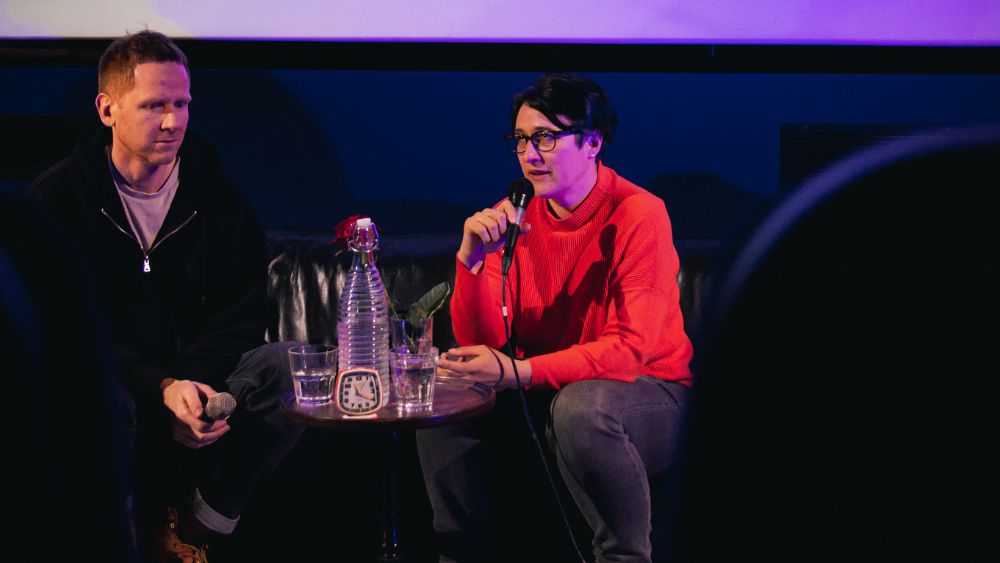
“It was the stay in Antarctica, in the middle of raw nature, that truly opened her eyes.” Viera Čakányová – In interview
Viera Čakányová is a documentary filmmaker who likes to mix big ideas and surrealism into the
reality she captures. “It was not a simple direct journey for me to become a filmmaker from
being a kid. I don’t even think my parents would have appreciated that idea very much then.”
She studied philosophy, history and French in her home country Slovakia.
White on white and Frem are companion pieces, both filmed during the time that Viera stayed at
a Polish base in Antarctica. Previously, she has made films where she incorporates elements of
fiction, documentary, experimental and animation, but for these two projects she decided on a
more bare-bones style. White on white was not originally supposed to be made but started out
as more of a video diary for Viera to keep her sanity in the rough conditions that the location
posed. Frem is made from the perspective of AI and set in Antarctica. White on white is set from
a human perspective, while interacting with AI.
Viera studied screenwriting in Bratislava, but realized that fiction was not really up her alley, so
then she made her way to Prague to pursue a degree in documentary filmmaking. “I needed
direct contact with reality, rather than something fabricated.” Having to operate the equipment as
a one person crew intrigued her as well.
The AI in White on white is not an actual artificial neural network. Viera has done research and
interacted a lot with neural networks in the past years. She wrote the messages herself that the
supposed AI “ann_w” sends her. She imagined what an AI network that had been fed on the
theory of thermodynamics would respond with to her questions on the meaning of life, and
beauty. Ann_w responds to Vieras questions with cold facts, that beauty is subjective and
meaningless in the context of the universe. To ann_w the meaning of life is to dissipate solar
energy, meaning that as everything on earth uses the UV rays and heat that the sun emits until
we meet our inevitable death when the sun swallows the earth. Viera filmed and edited White on
white back in 2017. Actual AI networks back then were not as developed and “smart” as they
are today. For this reason, she chose to serve as the thinker behind a future, more developed
AI.
“(Frem) is shot from the point of view of an AI entity that is surveying its surroundings in
Antarctica. So there is barely any human element in it at all. It was a challenge for me to make
this entity alive and to bring the audience into the head or the mind or the body of this thing and
somehow make a connection.”
The material for White on white was recorded at the Polish base during the breaks Viera and
her two man crew took from filming Frem in the middle of nowhere. The duality between Frem
and White on white is very interesting in the way that Viera set out to tell an Antarctica story
from an AI perspective, but found along the way that her own voice had something to say on the
matter. In post production, she presented the editing team with only a part of the material that
she recorded, as a lot of it was too personal. When looking at it in relation to the material for
Frem, her editor suggested that they make a whole separate film as they had plenty to work
with. Viera had not made a documentary with herself as the main character and narrator before.
White on white bears a strong message of the importance of environmental protection. Viera
had not been a particular advocate of the cause or involved in any such programs, although she
was of course aware. It was the stay in Antarctica, in the middle of raw nature, that truly opened
her eyes. At the Polish base the surroundings are constantly changing, mostly due to global
warming. “No one is allowed in Antarctica without support and supervision from one of the
research bases there. The Polish base is one of the biggest there so they were able to take my
team; myself and two others. […] It is so surreal to see the juxtaposition between a team of
researchers there that are recording the effects of global warming on the Arctic, and are all the
while getting huge shipments of resources from the other side of the globe and burning massive
amounts of fuel just to survive that place.”
Viera mentions that if she weren’t a documentary filmmaker, she’d probably pursue a career in
science. She is very interested in the connection that can be made between documentary and
science reports. In an upcoming project Viera will be looking at fungi and their underground
network, and mentions that she’s been following research into transforming fungal network
communication into music, and dialog. The film will show how the fungal biological structure is
able to process toxic waste into harmless materials. She will be looking at an old soviet era
dump site in Slovakia that is threatening to pollute the local soil and water supply. To tell the
story, animation and documentary footage will be utilized along with other mediums. When
asked whether she has seen the apocalyptic series The Last of Us, Viera laughs and answers:
“Not yet.”.
– Written by Katla Gunnlaugsdóttir

